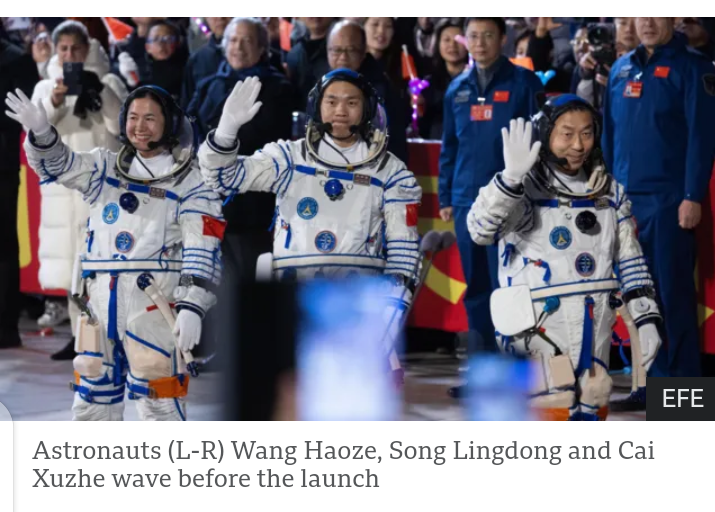China Declares Success As Its Youngest Astronaut Crew Reaches Space.
China celebrated the successful launch of its Shenzhou 19 spacecraft, marking another milestone in its ambitious space programme. The three-person crew, including China’s first female space engineer, Wang Haoze, docked at the Tiangong space station following a journey of over six hours. The mission is set to last six months, during which the crew will conduct experiments and undertake spacewalks as China prepares for an eventual Moon mission by 2030.
The launch, heralded as a “complete success” by Beijing, is part of an unprecedented year for Chinese space exploration, with over 100 launches planned. The BBC was granted rare access to witness the spacecraft’s take-off at the Jiuquan Satellite Launch Centre, where the rocket ignited the Gobi Desert in a fiery display, much to the cheers of hundreds who had gathered to support the taikonauts – China’s term for astronauts.
Onboard the Tiangong station, the Shenzhou 19 crew joined the Shenzhou 18 team, who are set to return to Earth in early November. Captain Cai Xuzhe, a veteran astronaut, expressed his pride in working alongside younger colleagues born in the 1990s, saying, “Their youthful energy has made me feel younger and even more confident.” Song Lingdong, another member of the crew, reflected on his dream to serve his country through space exploration, inspired by watching one of China’s early missions as a child.
As China forges ahead in space, the competition between the United States and China intensifies. NASA administrator Bill Nelson recently characterised the two nations as being in a “race” to the Moon, cautioning that China might seek to establish territorial claims. Meanwhile, General Stephen Whiting, head of US Space Command, noted that China and Russia have been significantly expanding their satellite networks, raising concerns over the potential militarisation of space.
Chinese officials, however, emphasise a commitment to peaceful space exploration and international collaboration. Li Yingliang, director of China’s Manned Space Agency, dismissed rivalry claims, saying China’s goals include advancing humanity’s understanding of space and promoting scientific cooperation.
China’s progress in space exploration has been rapid. In recent years, it has landed a rover on Mars, retrieved samples from the Moon, and launched the first of what it hopes will become a satellite constellation to provide global internet coverage, rivalling SpaceX’s Starlink. These advancements have fuelled national pride, as seen in Dongfeng Space City, where flags, statues of astronauts, and rockets adorn public spaces, symbolising a country determined to lead in space.
With plans for lunar missions and ongoing research on the Tiangong station, including studies that may benefit medicine on Earth, China’s focus on space exploration is clear. President Xi Jinping’s administration has shown unwavering support for the programme, even amidst economic challenges. As China looks to the Moon and beyond, its rivalry with the United States seems poised to shape not just geopolitical dynamics on Earth, but potentially those across the stars.



